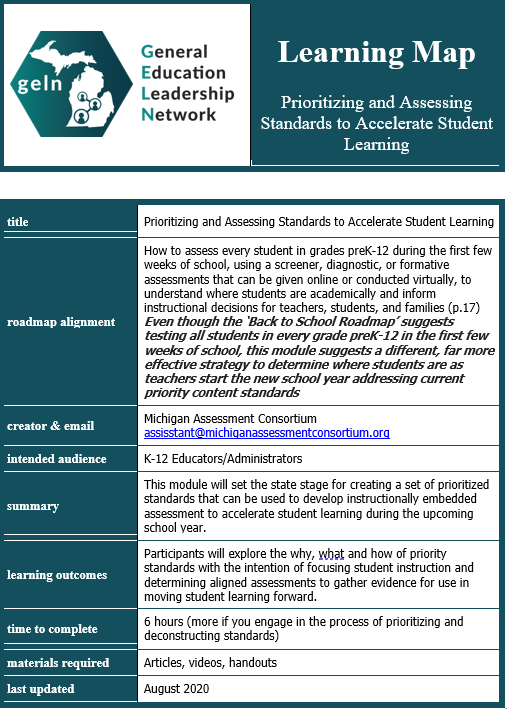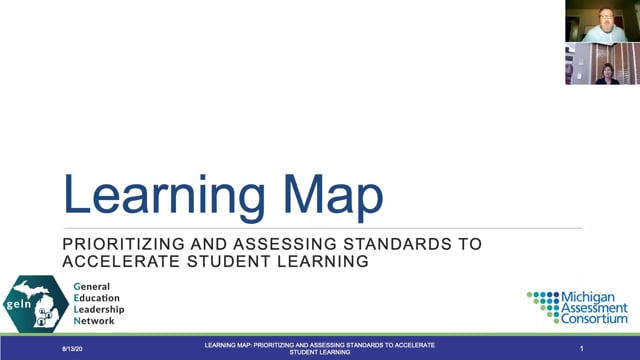Can we accelerate student learning by prioritizing and assessing standards?
When students and their teachers return to learning for the 2020-21 school year, they will confront learning interruptions from COVID 19. Prioritizing grade-level standards and focusing instructionally embedded assessments and formative assessment practices on current grade-level standards promises to accelerate student learning. This strategy can help schools avoid the loss of valuable time identifying what wasn’t taught last year, and it provides the most equitable option available for Michigan’s students.
Four principles guide the assessment of prioritized grade-level standards, as described in the next column.
- Assessment should be used to determine how to bring students into grade-level instruction, not whether to bring them into it. Assessment should not be used as a gatekeeper to grade-level content.
- The formative assessment process is our strongest tool to support and accelerate learning and growth; we must use it.
- Targeted checks using instructionally embedded assessments (IEAs), followed immediately by the use of that information, will support instruction; use of diagnostic assessments, as suggested by IEAs and/or formative practices, will be helpful.
- The first several weeks of school should focus on students’ social, physical, and emotional well-being and strengthen relationships and establish cultures conducive to learning.

In the context of COVID-19, school districts are working from comprehensive plans aligned to Michigan’s 2020-2021 Back to School Roadmap and new state laws—all of which depend on professional learning. The resources offered below support a free Asynchronous Professional Learning Map titled, Prioritizing and Assessing Standards to Accelerate Student Learning. The Learning Map was prepared by the Michigan Assessment Consortium and offered in partnership with MAISA’s General Education Leadership Network (GELN) Continuity of Learning Task Force. It is one of a library of Learning Maps available on GELN’s interactive website to support local professional learning plans and provide high-quality resources to all teachers across Michigan in 2020-21. It includes hyperlinks to all suggested resources, coordinated to support the learning of groups or individuals from engagement through extending the learning.
Another MAC-produced Learning Map, Formative Assessment in Online Learning Environments, is also available as a curated collection.

This short introduction to the Learning Map, Prioritizing and Assessing Standards to Accelerate Student Learning, builds shared understanding for WHY we recommend prioritizing and assessing grade level standards to accelerate learning and then provides an overview of suggested resources and activities.
We’ve featured select resources from the Learning Map, Prioritizing Standards, in the collection below.
Resources include video interviews offering three perspectives— disciplinary, system and district; two recorded “how to” presentations—prioritizing and unwrapping standards (with accompanying facilitation guides) and development of performance assessments; and tools to better understand what instructionally embedded assessments (IEAs) are and when and how to use them.
2020-21 Priority Instructional Content in English Language Arts/Literacy and Mathematics
Student Achievement Partners developed this report to share research and progressions of prioritized content standards for ELA (K-12) and Mathematics (K-8) for the purpose of finding efficiencies in the curriculum as we return to school fall 2020 during COVID-19
A Discipline Perspective About Assessment Practice to Promote Learning in 20-21
The recorded interview and companion Summary Handout features Kathy Berry, immediate past president of MCTM. Her discipline perspective about Mathematics instruction and assessment applies to all content areas.
A District Persepctive on the Value of Prioritizing Standards to Promote Learning 2020-21
The recorded interview and Summary Handout features Donna Jakubik, prinicipal Maples Elementary School. This principal explains why and how her staff engaged in prioritizing standards to help focus and align assessment practice as they prepared for Fall 2020.
A Systems Perspective: Assessment Practice to Accelerate Learning in 2020-21
The recorded interview and Summary Handout features Ed Roeber, MAC Assessment Director. The interview suggests emphasizing the use of IEA's and formative practices with grade-level standards to support & accelerate learning.
Embedding Performance Assessment in Instruction
The recorded presentation with Ed Roeber, Assessment Director, MAC, and accompanying article Re-balancing Assessment by Hoffman, Goodwin and Kahl set the stage to create a set of prioritized standards and develop performance assessments to embed in ongoing instruction and highlight the benefits of collaboratively scoring student work
Instructionally Embedded Modes of Assessment
This tool defines an IEA - which integrates instruction, learning and assessment into instructional sequences. Steps to implement IEA's in classroom use are recommended. A table of IEA's with hyperlinks to examples is provided for quick access and further learning
Michigan Arts Education Instruction and Assessment (MAEIA) website
The MAEIA website houses a catalogue of 360 performance assessments for 4 arts disciplines: theatre, dance, music and visual arts K-12. As well as many resources and tools, including sample lessons and program improvement resources
Why, What and How – to Prioritize and Deconstruct Standards & Align Assessment
This presentation with Facilitation Guide features Ellen Vorenkamp, assessment consultant, who recognizes the power and purpose of priority standards. Overviews identification and deconstruction techniques. And previews aligning assessment methods to standards.
